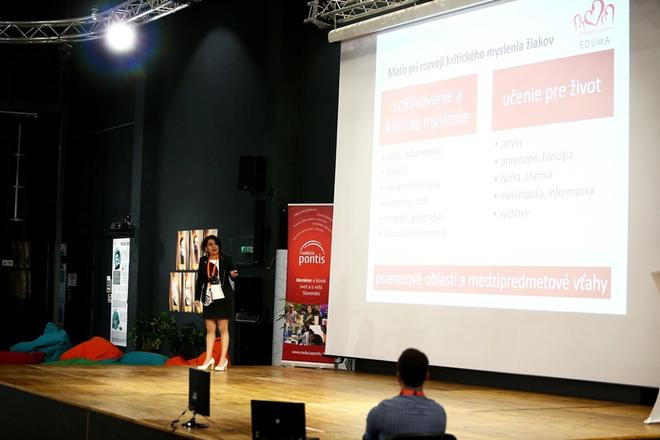Storytelling is one of the most effective ways to describe any topic, even to the youngest children. This is one of the main motifs behind the Online Live Library project developed by the non-governmental organisation Eduma.
It has created an interactive website which features dozens of stories, told directly by people who have come across many obstacles in their life. Thanks to them, children can better understand their situation and gain new perspectives on certain topics. This helps them become more empathic and promotes critical thinking, explained the project’s author Janette Motlová.
This, along with two other projects developed to improve the education at Slovak schools, was recently awarded as part of the Generation 3.0 project run by the non-governmental organisation Pontis Foundation.
“These projects assured us that the change in the education system is already happening, but it needs to be supported,” Norbert Maur, programme manager at Pontis Foundation, told The Slovak Spectator.
The Generation 3.0 initiative was supported by the US Embassy in Slovakia which provided the NGO with a grant that will bring US experts in education to Slovakia. They are expected to share their experiences with assessing the impact of the selected projects and their potential to spread to regional and national levels.
“This is essentially a way to make smart investment decisions,” US Ambassador to Slovakia Adam Sterling told the press during the introduction of the Generation 3.0 project.
Innovative approaches
Another awarded project is run by the Bilingual Grammar School of C. S. Lewis in Bratislava. It focuses not only on quality education, but also on the development of pupils’ personalities. As a result, part of the school’s curricula includes character education that is applied in all subjects and at all levels, from pupils, through teachers, to the school’s management.
“The jury appreciated the complexity of the approach that is based on acquiring knowledge, but also on character and value education,” Maur said, adding that it also deals with the topics that are otherwise circumvented.
The award also went to the ChemPlay project by a civic association that supports talented children, SOVA. Its authors are secondary school students Ivana Kravárová and Adrián Hegedúš who created a table game that introduces inorganic chemistry, its logic and rules. The “players” use analytical and critical thinking, as well as team cooperation.
In this case, the committee evaluated the fact that it was developed by young students who should serve as an example of future graduates from Slovak schools.
“In a very entertaining and effective way they help their peers to learn about the beauty of a subject that seems to be unattractive on the outside,” Maur added.
Assessment will follow
The Pontis Foundation has already started setting the criteria for assessing the impact of the winning projects, in collaboration with researchers from the National Institute of Certified Measurements, as well as two faculties of pedagogy from Bratislava and Trnava.
The US experts are expected to arrive in autumn. They will help not only the winning projects, but also the others that participated in the Generation 3.0 Awards, Maur said.
“The experts will participate in opening one of the regional trusts that should become a platform to share experiences, connect the partakers in education and spread educational approaches across Slovakia,” he added.
The Pontis Foundation also plans to submit the results of the impact assessment to the Education Ministry which may then work with them further.
Strengthening democracy
The US Embassy believes that education is important for the development of the knowledge-based economy that is necessary for the continual prosperity of Slovakia, and not only in the economic field. It also strengthens democracy, according to Sterling.
“It protects against extremism and other simplistic thinking and even non-thinking,” said Sterling.
The embassy thus sponsors several academic exchange programmes each year, such as the Benjamin Franklin Transatlantic Fellowship Program, the Study of US Institutes Program and the Holocaust Teacher Training Program.
Moreover, it facilitates private sector exchange programmes, which includes secondary school student exchanges, au pair programmes and internship opportunities. The most popular is the Summer Work and Travel programme, through which almost 3,000 Slovaks travel to the United States each summer, said US Embassy in Slovakia’s spokesperson Stephanie Fitzmaurice.
“It’s one of the easiest and most cost-effective ways for young Slovaks to see America, experience its culture, and meet its people,” Fitzmaurice told The Slovak Spectator. “It’s also a great way for Americans to meet students from Slovakia and learn about your country and culture.”
In addition, the embassy regularly sends its representatives, as well as visiting US professional speakers, to Slovak schools and universities to speak on a variety of topics, ranging from travelling or studying in the US, to politics and American culture, the spokesperson added.
Help to develop skills
The flagship of the exchange programmes supported by the US Embassy in Slovakia is the Fulbright Program, which has been running since September 1994.
The Fulbright Commission gives Slovak graduate students, researchers, teachers and professionals the opportunity to apply for various grants, though their number is limited to the flat funding provided by both the US and Slovak governments, explains Nora Hložeková, executive director of the J. W. Fulbright Commission in Slovakia.
While 340 Americans have travelled to Slovakia so far to study, teach, conduct research, exchange ideas and contribute to finding solutions to mutual international concerns, over 320 Slovaks have done the same in the US, said Sterling.
One of the main benefits for the applicants is a chance to develop their academic and research skills, according to Hložeková.
“Fulbright participants are ambassadors of their countries; the experience is usually the most influential period of their lives,” she told The Slovak Spectator. “It also provides students and scholars with the opportunity to collaborate and build life-long personal and professional relationships.”



 The presentation of Online Live Library project (source: Courtesy of Pontis Foundation)
The presentation of Online Live Library project (source: Courtesy of Pontis Foundation)